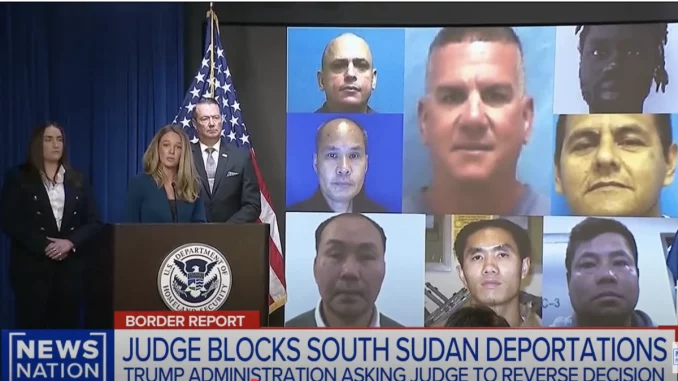
| Published June 25, 2025
Rogue federal judge wants robbers, rapists and murderers to have ‘time to express any concerns they might have.’
A recent opinion piece criticizes a federal judge for temporarily halting the deportation of violent illegal immigrants to third-party countries. The judge’s decision is portrayed as part of a growing pattern in which members of the judiciary are seen as placing the rights of criminal non-citizens above public safety. The commentary reflects ongoing national tensions over immigration enforcement, judicial intervention, and the extent of executive authority in managing deportations.
✅ Fact & Legal Context
-
Judge Brian Murphy’s order did temporarily block deportations of eight violent migrants to a third country like South Sudan or Djibouti without providing them an opportunity to raise safety concerns—in violation of due process norms.
-
The Supreme Court, on June 23, stayed Murphy’s injunction—allowing the government to continue third-country deportations while appeals proceed.
-
Why it matters: Murphy based his actions on constitutional due process rights—requiring time for migrants to assert the risk of torture or death if deported to unstable nations. The Supreme Court’s conservative majority held that the administration has broad authority to remove criminal aliens—including to third countries.
🔍 Broader Developments & Counterpoints
-
Supreme Court Ruling
-
Reaffirmed the administration can remove criminal migrants to third-party countries even if migrants lack ties there.
-
Liberal justices dissented, warning of serious human rights implications if due process is ignored.
-
-
Other Immigration Court Rulings
-
In Maryland, a separate case involved Kilmar Abrego García—wrongfully deported to El Salvador—where a judge ruled the government failed to prove he posed a danger or flight risk.
-
-
Ongoing Protests & Tensions
-
The backdrop includes mass deportation protests (e.g., Los Angeles, since June 2025) and media scrutiny of third-country removals, some likened to detention in Guantánamo or similar transfer scenarios.
-
 Implications
Implications
-
Limits on Executive Authority
-
Judicial blocks on deportation orders may restrict the president’s ability to enforce immigration policy, especially when involving third-country removals.
-
-
Precedent for Due Process Rights
-
Rulings like Judge Murphy’s could strengthen legal protections for even violent or criminal non-citizens, potentially expanding due process claims in future immigration cases.
-
-
Increased Legal Challenges
-
The decision may invite more court battles between federal judges and immigration enforcement agencies, creating delays and confusion.
-
-
Public Safety Concerns
-
Critics argue that keeping violent offenders in the U.S. poses risks to communities and undermines trust in the justice system.
-
-
Political Polarization
-
The case deepens the ideological divide between those advocating for strict immigration enforcement and those prioritizing human rights and legal safeguards.
-
-
Sanctuary Jurisdiction Tensions
-
The refusal of left-leaning cities to house migrants ordered deported further complicates enforcement and escalates federal-local conflicts.
-
-
Impact on Future Deportation Policy
-
The backlash may influence how future administrations craft deportation strategies, including the use of third countries as destinations.
-
-
Judicial Accountability Debates
-
Accusations of “rogue” judges revive questions about judicial activism and the appropriate role of courts in immigration matters.
-
💬 Overall Takeaway:
The heated response to Judge Brian Murphy’s ruling reflects the deep divisions within the United States over immigration policy, judicial authority, and national security. While some view the judge’s actions as a necessary defense of constitutional rights, others see them as a dangerous obstruction to law enforcement efforts aimed at protecting the public from violent offenders. This debate is not just about a single court decision—it symbolizes the broader struggle between preserving due process and ensuring swift, decisive action against individuals who pose a threat. As the legal battles continue and public pressure mounts, the nation’s approach to immigration and judicial accountability remains a contentious and evolving issue.





Be the first to comment